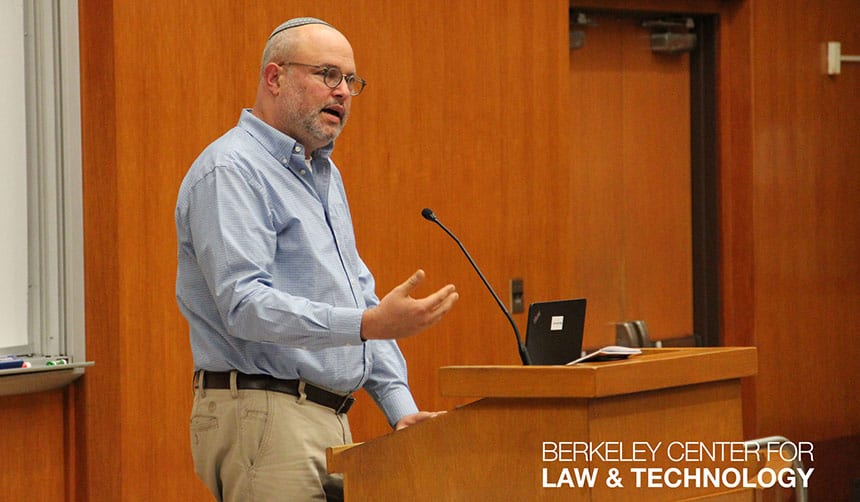
By Andrew Cohen
For 20 of the past 22 years, Berkeley Law’s intellectual property law program has been ranked No. 1 in the nation among U.S. law schools. Resting on laurels, however, is not part of the program’s DNA.
Berkeley Law offers a whopping six new tech-law courses this school year—four next semester—augmenting an already rich curricular trove in the field. Keeping pace with tech law’s expanding practice areas is essential for giving students the best possible training, says Berkeley Center for Law & Technology (BCLT) Executive Director James Dempsey.
“The faculty, coordinated by Associate Dean for JD Curriculum and BCLT Faculty Co-Director Molly Van Houweling, are constantly assessing our course offerings to be sure that we’re covering both the still-central basics of IP law—patents, copyright, trademarks, trade secrets—as well as emerging areas of privacy, cybersecurity, and innovation in the life sciences,” he says.
New tech law courses for spring semester include:
Cybersecurity Law and Policy, which will probe the different sources of companies’ obligations to protect information, the growing case law around liability, types of government regulation, steps that victims of cybersecurity intrusions can take in self-defense, and the field’s emerging international law.
Privacy Counseling & Compliance, which will explore the substantive and ethical implications of this new practice area. As the demands of privacy compliance grow, there is an expanding role for lawyers in the design of technology products and the shaping of business strategies.
Antitrust and Innovation, which will cover antitrust law’s real-world application to industries that pioneer tech and life sciences innovation. Taught by two Silicon Valley practitioners, this course will also explore economic and public policy issues associated with areas such as mergers, big data, and licensing strategies.
Reproductive and Genetic Technologies, which will examine the promise (and potential peril) of human reproductive and genetic technologies such as assisted reproduction, embryo screening to choose a child’s genetic makeup, and personalized therapies that are redefining modern medicine.
This semester, students are enrolled in two new courses: Encryption Workarounds considers the legal and practical framework that regulates government efforts to bypass encryption in criminal investigations that involve digital evidence, and Biotechnology Law (co-taught by two in-house counsel at biotech companies) examines legal issues encountered uniquely and frequently in the biotech industry.

Space Law, first taught a year ago and offered again next semester, introduces students to the U.S. regulatory frameworks for spacecraft, satellite communications, and Earth imaging—as well as ongoing legislative efforts to address issues including harvesting the resources of celestial bodies and human settlements in space.
Business boom
The growth of the school’s business law program is downright dizzying. During the current academic year, the curriculum offers more than 60 courses in business law, more than 20 core faculty members in the field, more than 10 special guest courses taught by business leaders.
“We aim to be the leading venue for conversations about corporate governance, equity and inclusion, financial fraud, mergers and acquisitions, venture capital, and other important policy issues, consistent with UC Berkeley’s role as the world’s leading public university,” says Adam Sterling ’13, executive director of the law school’s Berkeley Center for Law and Business.
Three business courses will debut next semester:
Antitrust and Technology Platforms will explore the application of antitrust laws to the digital economy. Taught by a partner at Davis Polk, the class will delve into timely issues of antitrust, one of the most significant regulatory areas that affect technology deals today.
Business Basics for Lawyers will introduce students to the fundamentals of business and finance. A unique mini-business school bootcamp of sorts, it will be taught by a successful investor and financier with the understanding that attorneys are increasingly looked to as business advisors.
The Court of Public Opinion: Storytelling for Corporate Lawyers, taught by Square’s head of communications and policy, will amplify how corporate attorneys can use storytelling and other communication skills to advocate for their clients and positions.
Two other popular courses have been updated for the upcoming semester: Governance in Venture Capital, taught by the managing partner of Andreessen Horowitz, will delve into the most important issues impacting startups in Silicon Valley—governance, or the lack thereof. Social Enterprise Law, co-taught by the lawyer who drove the creation of the public benefit corporation, will explore how companies and nonprofits can effectively leverage impact and help address the world’s most pressing social and environmental issues.
“If there is a debate about law and business,” Sterling says, “we want to lead the discussion.”